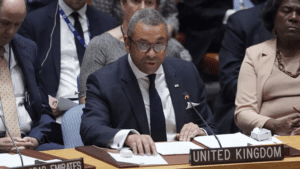James Cleverly, the UK Foreign Secretary will today chair the first ever UN Security Council (UNSC) session on Artificial Intelligence (AI).
Taking place in the Security Council Chamber in New York, the high-level briefing will discuss the potential implications of AI on international peace and security and how to promote its safe and responsible use.
As chair, the Foreign Secretary invite remarks from António Guterres, Secretary-General of the United Nations, Jack Clark, co-founder of leading AI company Anthropic, and Professor Zeng Yi, Director of the Brain-inspired Cognitive Intelligence Lab and co-Director of the China-UK Research Center for AI Ethics and Governance.
Mr Cleverly is expected to say: “No country will be untouched by AI, so we must involve and engage the widest coalition of international actors from all sectors.”
“The UK is home to many of the world’s trail-blazing AI developers and foremost AI safety researchers. So, this autumn the UK plans to bring world leaders together for the first major global summit on AI safety. Our shared goal will be to consider the risks of AI and decide how they can be reduced through coordinated action.”
“We must seize these opportunities and grasp the challenges of AI – including those for international peace and security – decisively, optimistically and from a position of global unity on essential principles.
“Rapid developments in AI technologies have the capacity to fundamentally transform our societies and the way we live and work. Global cooperation will be vital to ensure AI technologies and the rules governing their use are developed responsibly in a way that benefits society.”
Last month, the Prime Minister announced the UK will host the first major global summit on AI safety. The summit will consider the risks of AI, particularly at the frontier of the technology, and discuss how they can be mitigated through internationally coordinated action. It will also provide a platform for countries to work together on further developing a shared approach to mitigate these risks.
Responding to the news, Chris Downie, CEO at fraud detection platform Pasabi said, “AI is already being hijacked to by cyber criminals to fuel online fraud, and fake reviews, at a cost of potentially billions to the global economy, so this summit cannot come sooner enough. It’s vital that policymakers and industry leaders collaborate and recognise the scale of the problem and put measures in place to clamp down hard on these threats.”
Sjuul van der Leeuw, CEO of Deployteq said: “With AI set to transform the global economy beyond all recognition, having a global taskforce in place to manage the implications, challenges and risks of this change is a necessary measure. From the public sector to the creative industries, AI has the potential to turbocharge organisations for the better, but the technology should also be managed responsibly, and workers need to be given the right training and support to adapt in a rapidly changing world.”
The UK is a world leader in AI and well-placed to convene discussions on the future of AI, – ranking third globally across several metrics. Our AI sector is estimated to contribute £3.7 billion in gross value added (GVA) to the UK economy and employs over 50,000 people, developing AI solutions across all sectors of the UK economy.
Read more:
Foreign Secretary to call for ‘international cooperation’ over AI threat


























